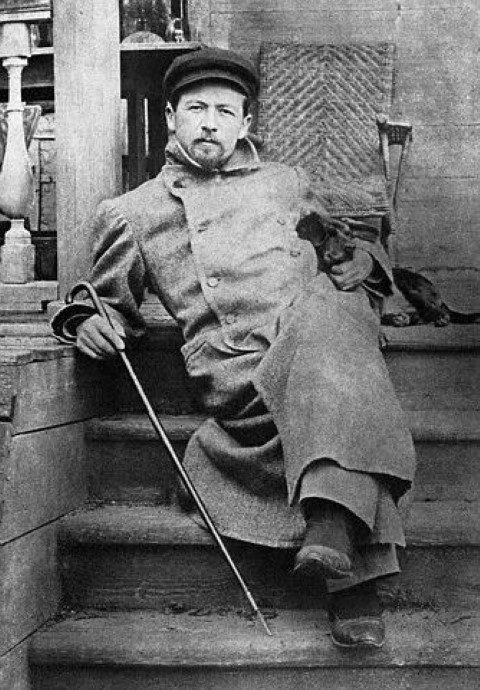Stanley Gutiontov
Chicago, Illinois, United States
 |
| Anton Chekhov |
“Andrei Yefimich understood everything. Without saying a word, he walked to the bed Nikita had given him and sat down; seeing that Nikita was waiting, he stripped naked and became embarrassed. He then put on his hospital clothes; the pants were too short, the shirt was too long, and the robe stank of smoked fish” (437).
The broad-shouldered doctor—soft-spoken, kind and unconscionably meek—is changing into the clothes of his former patients, poor unfortunates who have been shuttered away from 19th century Russia in Ward No. 6 of a dirty, poorly run provincial hospital, hounded by the ward guard Nikita as by Cerberus out of hell. The extent of his illness: finding delight in his conversations with Ivan Dimitrich, a young paranoid schizophrenic in residence there.
Anton Chekhov wrote “Ward No. 6” in 1892, the same year he bought a country estate in Melikhovo with the money he had made from his literary pursuits. There he routinely made long journeys to treat sick peasants for free while himself ill with the tuberculosis he had contracted years earlier treating the Moscow poor. In the story he views the world from the eyes of both patient and physician.
Ivan Dimitrich—a well-read law clerk—is walking down the street one day when he passes a group of policemen with two shackled convicts in tow. This everyday occurrence triggers a cascade of musings culminating in intense paranoid delusions. He is committed to ward no. 6 but not before his thoughts evolve: “People who by their profession have to deal with the suffering of strangers—for example judges, policemen, doctors—with time and through force of habit, harden themselves to such an extent that they cannot, try as they might, relate to their clients in any way but formally” (400). A thought of awful clarity for a madman . . .
Importantly, the story is not set in a time when doctors can offer nothing more than warmth to their patients. He writes that “in the last twenty five years, medicine had undergone a magical change . . . anti-sepsis . . . treatment for syphilis . . . the theory of inheritance . . . the discoveries of Pasteur and Koch” (411-412). Chekhov detailed a system similar to ours, in which health-care workers can offer their patients the benefits of many scientific advances but often fail to provide them with that most ancient of elixirs: sympathy. Andrei Yefimich, aware of this hypocrisy but unable to rise above it, retreats from his patients into his books, content to read until the fateful day when he meets Dimitrich.
Their conversation is heated. The patient speaks of his suffering, the doctor of Stoicism, both quoting freely from their prodigious literary knowledge. An infuriated Dimitrich asks the doctor: “’Who are you to speak of Stoicism, are you a philosopher?’ ‘No, I am not a philosopher, but everyone should preach this because it is reasonable.’ ‘No, I want to know why you consider yourself knowledgeable with regards to contempt for suffering? Have you ever suffered? Do you understand suffering?’” (420). Yefimitch has not experienced it, does not and cannot understand it.
He begins to frequent ward no. 6 and finds great satisfaction in speaking with Dimitrich. This unusual behavior is noticed by Nikita, who relays this information to Yefimitch’s colleague, the power-hungry Hobotov. A council is convened to judge whether or not Yefimitch is fit to work; he is interrogated: “’Andrei Yefimitch, what is today’s date?’ Getting the answer, he [Hobotov] and the blond doctor—with the tone of examiners and aware of their own ineptitude—start asking Yefimitch what day it was, how many days in a year and is it true that in ward no. 6 there lives a wonderful prophet?” (424).
After the council disperses, Yefimitch is flustered, angry.
“My god—he thought, recalling how the doctors had just interrogated him—why they have just had their psychiatry lectures, passed their exams—from whence this complete ignorance? They know nothing of psychiatry!” (425).
These charlatans relieve him of his post; Yefimitch is eventually reduced to such a destitute state that he allows himself to be misled by Hobotov and is locked away in ward no. 6.
There, he experiences the utter despair of which Dimitrich spoke; clothed in unfamiliar, smelly garb, Yefimitch sits on the bed, paces the room, looks out the window across a field at a rusty fence, at a jail, at the moon, and he is afraid. His talk of Stoicism provides little succor when Nikita beats him intensely.
From the pain he bit the pillow and gritted his teeth, and suddenly in his head, amidst the chaos, clearly flashed the horrifying, unbearable thought, that these people who now looked like black shadows in the moonlight had for years experienced exactly this kind of pain, day after day (438).
His revelation comes too late: Andrei Yefimitch dies of a stroke the following day. His corpse is carried out of ward no. 6. He is consigned to oblivion.
STANLEY GUTIONTOV is a third-year medical student at Feinberg School of Medicine in Chicago. He enjoys writing short stories and performing slam poetry, studying history and literature, and getting people excited about learning. He hopes to one day work in oncology.
Highlighted in Frontispiece Volume 14, Issue 1 – Winter 2022
Summer 2014 | Sections | Literary Essays

Leave a Reply